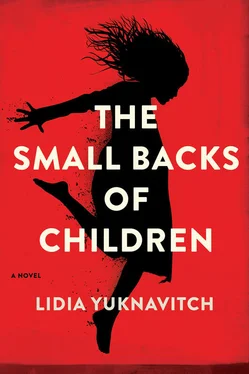She doesn’t know.
She says a prayer for the soul of this man, just as she said prayers for her dead father, her dead brother, lovingly. As lovingly as possible.
She aims the gun at him.
Then she pulls the trigger.
Blood shoots everywhere between them.
His face is not shocked or filled with hate or rage.
He looks peaceful.
He looks done.
Neighbors call the authorities. A Homeland Security SWAT team arrives, and the girl is arrested. A week and a half later, she is deported.
The poet will be arrested for illegal aid to an illegal alien. An Interpol search will be conducted to find the performance artist. The poet will write a book of poems from her time in jail. It will solidify her career as a political poet. She will win numerous prizes, in America and abroad.
The writer will be told what happened. She will go into her bedroom and close the door, very calmly. The filmmaker will nearly lose his mind with worry, but in only two days she will come back out of the bedroom. She will not go down. She will spend the rest of her life communicating with this young Eastern European artist. The art each makes will inform the other’s. The writer’s stories, the young woman’s paintings, between them everything. It will keep both of them making art until each of their deaths.
The girl will live on, in a country emerging on the world stage. Someday the economics of her country will count for something, or they will join up with another country and matter. Someday this girl’s paintings will meet an audience, whether over the Internet, or by cosmic accident, or through back channels and counterculture trades, through thievery or trade or black-market wishes. But they will find their way into the world, her paintings.
Superpowers will topple and reorganize.
China and India will become something we never imagined.
Russia will make new allegiances. Siberia, unfreezing, will become a land grab.
France will take on a militant tone, leaving its beautiful cultural tower to chase power after all these years.
Canada and Russia and Greenland will stake new claims in once-frozen waters.
Africa will become an out-of-reach commodity instead of the expendable refuse heap we’ve treated her as.
Germany will forgive itself so much that it returns to arms.
And the Middle East, well, I think we can all see what we’ve made there. What a hand we’ve had in the making of our own demise. How masterful.
And the world will continue to be melted by a sun we’ve crossed terribly with our progress.
Nations will shift like stones in the hands of a girl making a city in the dirt.
And men and women. . either they will finally see each other and do what must be done to evolve, or they will not.
The filmmaker and the writer will invent a kind of love from making art together and loving a son.
The painter takes one last look at her asleep on the futon and thinks: Enough.
He reaches under the futon, where he has always kept the gun. It fits into his hand like an identity. It’s nothing, really, his magnificent and glorious death drive, up against the stories the girl told him about what happened to her. What is a man? he thinks. Wishing he was the story. This girl. This astonishing, gendered thing. What she has endured.
The sleeper.
He places the gun inside his mouth.
He shoots, the blood spray making its beauty behind him. If only someone were there to recognize this kind of beauty, to admit it. If only someone were there to capture it.
The hospital curtain shivers, almost imperceptibly. The rise and fall of the writer’s breathing. The image of a heart monitor, the audio silenced.
Two women alone in a room. The lives that might have been.
And the photographer’s hand, as hushed as whisper, or was it love, resting a Polaroid of the writer upon her unconscious body.
The widow’s husband hid the last photo he’d ever taken of her, and smuggled it into the prison camp with him. What had been his life’s passion, photography, was now over, his equipment smashed in heaps of glass and black plastic, even his eyeglasses smashed in front of him under the heel of a boot. Twenty-eight years, they said. His sentence.
The sentence became his body. The photograph of his wife against his iliac crest.
It took only five years for the widow’s husband’s mind to wander in that prison camp, in ways that remind him of DNA drifting, or the disintegration of the stars.
After that, he began to have nightmares: a bloody torso inching its way along the frozen ground, a leg without a body being pulled by a dead horse. He wakes in the night as if waking were sleeping and sleeping, labor. A few days ago, he thinks, he may have met a man from a town he perhaps knew in his previous life. The man had stolen wood and was awaiting sentencing. Two days ago they had taken the man away. Yesterday he had returned. They had cut off one of his legs as punishment. The man’s leg looked like an enormous stick of bread, he remembered thinking. They brought it back with them and threw it out where it could be seen from the barracks. Fresh corpses were piled onto sleighs daily, and prisoners harnessed like horses would pull them with ropes, drag them several hundred meters from the barracks and pile them up as if for a bonfire. But never the leg. It was left to rot there in front of them, but not, freezing instead, not decomposing as an ordinary human leg might. It is strange what moves us and what does not.
My wife is not here.
And then his thoughts would fragment and tumble again.
Buttercups.
Entrails.
A boot.
A common treatment for frostbite was to hang a body, barely living, from the ceiling. One girl with sores all over her was hung by the armpits. One man, so starved and shrunken as to appear to be a boy, was hung by his feet.
Men would come and go in his barracks, either in his mind’s eye or in real time.
One was a writer.
With this man, he found bitter shared joy. He without a camera and he without a way to record his thoughts on paper. Art and ideas between them.
If he could produce a picture of their world, it would show hundreds of people curled fetal in their bunks like strange snails because scurvy had infected their joints. The white nights blew beyond thought. People reached the point where they had no sex, just the vague skeletal cage of a bodylike thing, mouths sunken in from lost teeth and disease, eyes glassy in their hollowed-out holes. He and the writer spoke many times of this imagined image. The writer absorbed it as a narrative.
One day the writer was taken away, and he did not see him again. His own strength faltered differently now. As with the loss of a lover or wife. He thought he saw him several times, far in the distance, in the night, the moon shining over a frozen forever delirium of cold. He thought he could see the writer framed by sky and the white of the snow, a skeletal figure, a stick man, harnessed like a horse, dragging the leg, with. . was it buttercups? Falling from the sky? All the images of his life blurring now into one.
How the body goes on living sometimes.
Did he forget himself?
The face of his wife. No, newspaper crackled and blowing across the frozen prison yard.
He finds himself standing exposed, as if shitting in a field in the hours of a long day’s labor, his genitals slowly sucking back into the cavities of his body, shrinking, retreating back. He is squatting, vulgar. He has no idea how long he has been this way. In sight the others are gathering wood, thistles, cones from the edge of a forest under the watch of armed guards. A soldier with a rifle, with a cigarette for a mouth. The rifle is perhaps less than five feet from his own dumb skull. He thinks he sees a flash of red. A woman leaning in to kiss the face of a lascivious soldier; no. A German shepherd dog’s tongue pink against dirty snow, licking a palm. A man’s penis pissing against dirty snow.
Читать дальше












